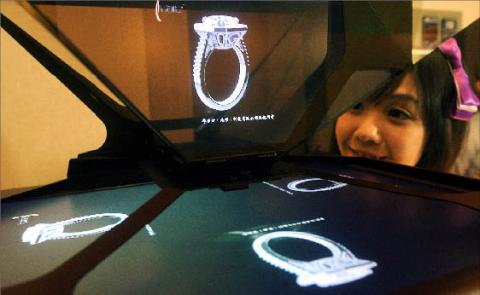The question of how to get 3D technology into every living room is set to dominate Computex this week, as the technology becomes cheaper and migrates from multiplex cinemas to ordinary homes.
“In the past, TV display resolutions were low, so people could only watch 3D movies in theaters, where they also had to wear goggles,” said Stephen Jeng, -secretary-general of the 3D Interaction and Display Alliance (3D互動影像顯示產業聯盟).
“Now, equipped with Blu-ray 3D players, people can watch [3D] movies at home on their own TVs.”

Photo: Lin Cheng-kun, Taipei Times
Most exhibitors are tight-lipped over what new gadgets they will unveil at the show, hoping the element of surprise will add to the impact on potential customers.
Among technologies confirmed to be on display is one developed by the Industrial Technology Research Institute (ITRI, 工業技術研究院), a semi-official research body, allowing 2D and 3D to be shown side-by-side.
Another example of what’s in store is The HoloAD, a box-like device developed by Taiwan-based company Innovision Labs Co (崴擎科技), which allows a 3D display for advertisements.
The development of 3D content remains slow because of high production costs, but forecasts for the sector are bullish.
This year, up to 12.9 million TV sets with built-in 3D are expected to be sold worldwide, up from 3.5 million last year, according to a forecast from ITRI.
Last year’s global sales of 3D TV panels accounted for 2.1 percent of the total number of panels sold worldwide said the institute, which expects the figure to triple this year before soaring to more than 50 -percent by 2015.
Technology giants such as South Korea’s Samsung and Japan’s Sony have already released 3D TV sets, and Taiwanese competitors are expected to follow later this year.
BenQ Corp (明基) and Chimei Innolux Corp (奇美) both plan to launch 3D TVs this year.
“Our 3D display sales in China, largely for use in desktop monitors and TV sets, will account for 20 percent of total shipments there,” Chimei Innolux spokeswoman Loreta Chen (陳靜燕) said.

COMPETITION: AMD, Intel and Qualcomm are unveiling new laptop and desktop parts in Las Vegas, arguing their technologies provide the best performance for AI workloads Advanced Micro Devices Inc (AMD), the second-biggest maker of computer processors, said its chips are to be used by Dell Technologies Inc for the first time in PCs sold to businesses. The chipmaker unveiled new processors it says would make AMD-based PCs the best at running artificial intelligence (AI) software. Dell has decided to use the chips in some of its computers aimed at business customers, AMD executives said at CES in Las Vegas on Monday. Dell’s embrace of AMD for corporate PCs — it already uses the chipmaker for consumer devices — is another blow for Intel Corp as the company

STIMULUS PLANS: An official said that China would increase funding from special treasury bonds and expand another program focused on key strategic sectors China is to sharply increase funding from ultra-long treasury bonds this year to spur business investment and consumer-boosting initiatives, a state planner official told a news conference yesterday, as Beijing cranks up fiscal stimulus to revitalize its faltering economy. Special treasury bonds would be used to fund large-scale equipment upgrades and consumer goods trade-ins, said Yuan Da (袁達), deputy secretary-general of the Chinese National Development and Reform Commission. “The size of ultra-long special government bond funds will be sharply increased this year to intensify and expand the implementation of the two new initiatives,” Yuan said. Under the program launched last year, consumers can

TECH PULL: Electronics heavyweights also attracted strong buying ahead of the CES, analysts said. Meanwhile, Asian markets were mixed amid Trump’s incoming presidency Taiwan Semiconductor Manufacturing Co (TSMC, 台積電) shares yesterday closed at a new high in the wake of a rally among tech stocks on Wall Street on Friday, moving the TAIEX sharply higher by more than 600 points. TSMC, the most heavily weighted stock in the TAIEX, rose 4.65 percent to close at a new high of NT$1,125, boosting its market value to NT$29.17 trillion (US$888 billion) and contributing about 400 points to the TAIEX’s rise. The TAIEX ended up 639.41 points, or 2.79 percent, at 23,547.71. Turnover totaled NT$406.478 billion, Taiwan Stock Exchange data showed. The surge in TSMC follows a positive performance

MediaTek Inc (聯發科) yesterday said it is teaming up with Nvidia Corp to develop a new chip for artificial intelligence (AI) supercomputers that uses architecture licensed from Arm Holdings PLC. The new product is targeting AI researchers, data scientists and students rather than the mass PC market, the company said. The announcement comes as MediaTek makes efforts to add AI capabilities to its Dimensity chips for smartphones and tablets, Genio family for the Internet of Things devices, Pentonic series of smart TVs, Kompanio line of Arm-based Chromebooks, along with the Dimensity auto platform for vehicles. MeidaTek, the world’s largest chip designer for smartphones